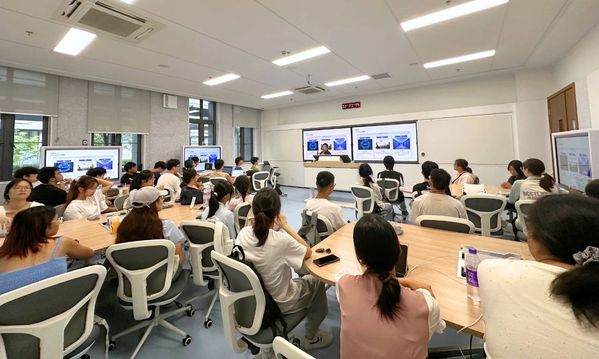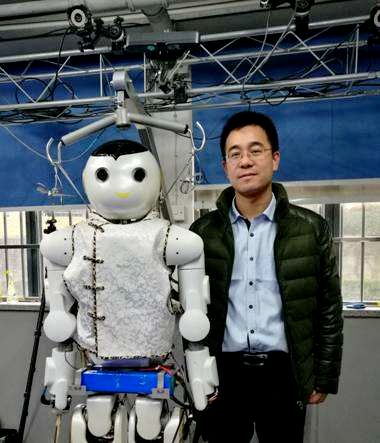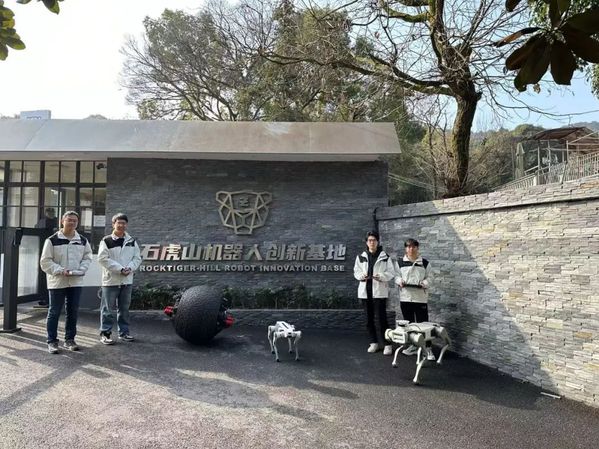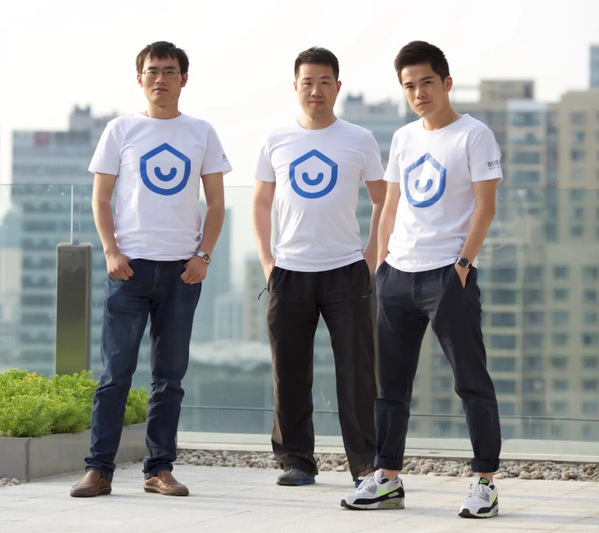Cracking the code: How Zhejiang University shapes the “Six Little Dragons”
Among Hangzhou’s rising “Six Little Dragons,” the founders of DeepSeek, DEEP Robotics, and Manycore Tech share a common origin — Zhejiang University. This raises the question: What is it about Zhejiang University that fosters such a remarkable breed of innovators and entrepreneurs?
Cultivating the pioneers of tomorrow
Fifteen years ago, when LIANG Wenfeng, the founder of DeepSeek, completed his master’s thesis at the Zhejiang University College of Information Science & Electronic Engineering, he penned a heartfelt acknowledgement. It was a tribute to the institution that shaped his path.
“My supervisor, XIANG Zhiyu, introduced me to the field of machine vision,” LIANG wrote. “He helped me structure my study plan, and provided research training, often guiding me through the code line by line.”
At that time, the College of Information Science & Electronic Engineering had already established a curriculum that kept pace with the frontier of technology, blending rigorous coursework with hands-on research. For Liang, stepping into the then-nascent field of machine vision was an invitation to push boundaries, explore cutting-edge theories, and conduct various meaningful engineering experiments.
His professors and classmates share a common perspective: true education isn’t about chasing grades; rather, it’s about deep, meaningful learning. While the College of Information Science & Electronic Engineering equips students with knowledge, it places even greater emphasis on nurturing their abilities, enhancing their qualities, and instilling a sense of mission in their study.
For Liang, the “rigorous academic atmosphere and spirit of collaboration, friendship, and ambition in science” became the foundation upon which he built his journey in artificial intelligence.
How can we better foster knowledge transfer and promote cross-disciplinary breakthroughs?
For Professor CHEN Hongsheng, Dean of the College of Information Science & Electronic Engineering, the answer lies in the college’s guiding philosophy: breadth, individuality and excellence. “We streamline essential required courses, offer a diverse range of optional courses, and empower students to build their own knowledge framework – one that equips them with adaptability and purpose for their unique career paths,” he explains.
Zhejiang University has been well-renowned for its forward-looking approach in talent cultivation. When LIANG Wenfeng pursued his studies, courses like Machine Learning and Pattern Recognition & Neural Networks, now considered fundamental in artificial intelligence, were already part of the university’s elective curriculum.
In fact, Zhejiang University recognized the promise of artificial intelligence as early as 1978, the year it established the Department of Computer Science. The university boldly placed “research on artificial intelligence theories and design of new-generation computers” at the top of its development agenda. In the same year, it welcomed its first cohort of AI-focused master’s students. Fast forward to 2019, Zhejiang University became one of the first 35 universities to launch an undergraduate AI program and secured approval from the Office of the State Council Academic Degrees Committee to establish China’s first interdisciplinary AI degree.
Today, the university continues to push the frontier with its AI for Education initiative. It has integrated AI literacy into the core curriculum, developed interdisciplinary AI+X courses tailored for various fields, and curated a suite of high-level AI textbooks. The launch of Zhihai, a next-generation AI science and education platform, underscores Zhejiang University’s commitment to hands-on innovation. Additionally, the publication of The Red Book on Artificial Intelligence Literacy for College Students and The Red Book on Artificial Intelligence Literacy for University Teachers signals a proactive approach to reshaping learning and teaching in the AI era—encouraging educators to embrace new methodologies and reimagine the classroom of the future.

Inspiring students to venture into the unknown
ZHU Qiuguo is the founder of DEEP Robotics. His journey into robotics began when he participated in RoboCup, the World Cup for robots as an undergraduate. He joined the ZJUDancer humanoid robot soccer team under the guidance of Professor XIONG Rong at the College of Control Science and Engineering. It was 2006 and Zhu was diving headfirst into the world of RoboCup. With each match, he fine-tuned both software and hardware, constantly pushing the limits of what his robots could achieve.
“Competing is the ultimate training ground,” Zhu recalls. “You have to fuse professional theoretical knowledge with hands-on practice, quickly absorb new concepts, and cultivate an independent research mindset.”

That mindset carried him through graduate school and into his academic career, where he deepened his work in humanoid robotics, bionic systems, and machine intelligence. From the development of the Wukong table tennis robot to the creation of quadruped robots Chitu and Jueying, Zhu built a legacy of continuous innovation.
Competition is a catalyst for creativity, teaching and learning. The College of Control Science and Engineering has created a seamless pipeline from coursework to competitions, from teaching to research, enlightening generations of robot enthusiasts along the way.
That spirit of exploration thrives at the Rocktiger-hill Robot Innovation Base, where Zhu’s work stands alongside groundbreaking projects in intelligent collaborative robots, medical robotics, autonomous driving technologies, and more. Here, the fusion of industry, academia, and research fuels new possibilities for innovation and entrepreneurship.
Zhu’s story proves that at Zhejiang University, learning is not confined to one classroom or one single mentor. Students are free to chase their curiosity, with the university providing a vast ecosystem of research opportunities.

On the Zhejiang University One-Stop Research Navigation Platform, students can unravel the mysteries of rice flowering, contribute to drug development, study the origins of the universe, or work on water conservation. In this dynamic “research marketplace,” they can choose the projects that spark their passion, connect with like-minded mentors, and create a future shaped by discovery.
Forging the “intangible” from the “tangible”
HUANG Xiaohuang and CHEN Hang, the founders of Manycore Tech, first crossed paths in 2003 as students in the mixed class at the Chu Kochen Honors College. This innovative program, a trailblazer in interdisciplinary education, was designed to cultivate well-rounded talents with a unique blend of skills and knowledge. The Chu Kochen Honors College stood out for its commitment to “a solid scientific foundation, a credit-based, personalized educational system, and a strong emphasis on English proficiency, computer literacy, research-oriented learning, extensive international exchange, and a culture of healthy competition.” Remarkably, these features remain strikingly relevant even today.

Reflecting on his time in the mixed class, CHEN Hang recalls, “It is there that I met a group of exceptional peers and had some of the best professors guiding us. The collaborative, inclusive environment in the class truly contributed to my personal growth.”
He continues, “I think the name the ‘mixed class’ speaks to its essence — it encourages students to dabble in a bit of everything.” The Chu Kochen Honors College follows a “2+2” model: the first two years are dedicated to a broad-based general education, immersing students in the fundamentals of chemistry, physics, mathematics, and computer science. This solid foundation not only equips students with essential knowledge but also fosters their ability to seamlessly navigate interdisciplinary challenges. The last two years, however, are all about personalized, autonomous professional education, giving students the freedom to explore new and emerging fields.
During his time at the Chu Kochen Honors College, HUANG Xiaohuang’s supervisor was Professor BAO Hujun from the College of Computer Science and Technology. In his second semester, he joined the lab, attended group meetings, and participated in research projects. It was under Professor Bao’s mentorship that he was first introduced to computer graphics, which would later become the foundation for his research into GPU computing and, eventually, his entrepreneurial journey.
“Zhejiang University was my first real step into society,” HUANG reflects. “It taught me how to engage with the world and navigate society. My entire value system was intrinsically shaped during those formative years at Zhejiang University.”
Adapted and translated from the article by CHEN Huixia, LIN Qianxu, CHEN Xuhang, KE Yineng
Translator: FANG Fumin
Photo: Interviewees and interviewed units
Editor: ZHU Ziyu, TIAN Minjie